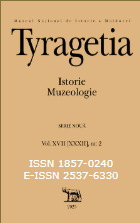Biserica În Timpul „Dezghețului Hrușciovist” (1953-1964)
The Church during the “Khrushchev Thaw” (1953-1964)
Author(s): Nicolae FușteiSubject(s): History of Church(es), Post-War period (1950 - 1989), Sociology of Religion, History of Religion
Published by: Muzeul Naţional de Istorie a Moldovei
Keywords: religious cults; Khrushchev Thaw; religious communities; legislation; impact; Stalinism;
Summary/Abstract: The death of the USSR’s number one Communist I.V. Stalin, of course, imposed some corrections in religious policy and legislative activity of state bodies in the religious sphere. In the early 1960s, after the final victory of N.S. Khrushchev, the supreme leadership of the country, under the pretext of strengthening the socialist legal state, tried to return the religious policy of the USSR to pre-war times by abrogating most of the normative acts from the first post-war decade. The decisions of the 20th Congress of the CPSU (1956) changed the balance of power in the party and state apparatus in favour of a firm line on religion. A potential danger for religious associations was also the course for “restoring Soviet legality”, which was taking place in the context of criticism of the cult of personality of I.V. Stalin, which inevitably affected the “Stalinist legislation on cults”. The beginning of the revision of the existing system of relations between the state and cults was marked by the note “On the shortcomings of scientific-atheistic propaganda”, developed by the Propaganda and Agitation Department of the CPSU Central Committee for the Union republics in the spring of 1958. It was a political decision to launch a new attack on the church on all fronts. During the „Khrushchev Thaw” the government of the USSR lost the initiative in legislative activity. The norms of the party exceeded the legislative norms, the appearance of any legislative act was preceded by the decision of the Central Committee of the CPSU. The end of the 50s and the beginning of the 60s of the last century was a dramatic period in the history of relations between the state and religion, marked by the last attempts of the Soviet state to resolve the issue of religion in the country as soon as possible. The period of the „Thaw” became a severe „freeze” for some confessions. The largest denomination in the country, the Orthodox Church, suffered the most In addition to the negative impact on the life of religious communities, the “Thaw” also had a positive effect. During this period, the phenomenon of religious dissidence was observed, the purpose of which was to restore religious freedom, stop the persecution of people for religious reasons and stop the interference of special services in the life of the Church. The process, of course, was associated with criticism of Stalinism, the loss of former ideals and the weakening of the authority of the party. All these disappointments awakened in a large part of society the desire to acquire faith and ideals. The “Thaw” expanded the space of freedom and made it possible to look for alternative cultures. An alternative could come from the Church.
Journal: Tyragetia (Serie Nouă)
- Issue Year: XVII/2023
- Issue No: 2
- Page Range: 247-260
- Page Count: 14
- Language: Romanian

